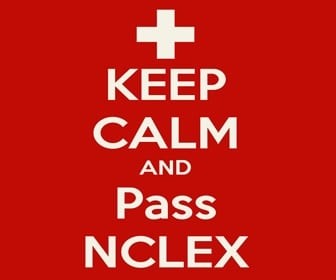Preparing for the NCLEX-RN exam can feel overwhelming. With so many study guides and resources available, it’s hard to know where to start. This guide provides a detailed review of various NCLEX study materials, helping you choose the best options to suit your learning style and time constraints.
After dedicating time to studying for the NCLEX, I accumulated a variety of review materials. Here’s my take on each of them:
NCSBN Online Review Course (5 Weeks)
This course is best for practice questions. The content isn’t the strongest for learning, but the questions are very similar to those found on the NCLEX. If you primarily need NCLEX-style questions and not a lot of content review, this could be a good option.
Kaplan – The RN Course Book: Preparation for the NCLEX-RN Examination (15th Edition)
 Keep Calm Pass NCLEX
Keep Calm Pass NCLEX
This book is a must-have for content review, especially if you’re short on time. You can read it in about a week with focused effort. However, it doesn’t contain practice questions and may not cover all the necessary information. I’d estimate it covers around 50-60% of what you need to know for the NCLEX. You’ll need to supplement it with practice questions from another source or Kaplan’s online review course.
Saunders Comprehensive Review for the NCLEX-RN Examination (5th Edition)
While this is a good review book, I found it to be too detailed and overwhelming. It includes more information than you necessarily need to study. The questions are decent, but they seemed relatively easy to me.
Prioritization, Delegation, and Assignment (PDA) by LaCharity (2nd Edition)
This book is crucial for mastering prioritization, delegation, and assignment questions. I believe it was the most helpful resource for preparing for the NCLEX-style questions, especially the priority, delegation, and assignment questions, which I encountered frequently.
Kaplan NCLEX-RN: Strategies, Practice, and Review (2011-2012)
I read this book thoroughly, but it wasn’t particularly helpful. It’s decent for practice questions, but not much else.
Exam Cram NCLEX-RN (3rd Edition)
You can quickly skim this book in about 2-3 hours. It provides a concise overview of the information you need to know for the NCLEX. However, due to its small size, it only covers approximately 30% of the information found in more comprehensive books like Saunders or Maryann Hogan. It’s a good source for NCLEX-style questions.
Maryann Hogan Comprehensive Review for NCLEX-RN: Reviews and Rationales (2nd Edition)
This is a must-have for both content and NCLEX-style practice questions, provided you have enough time to study. It takes about a month to thoroughly review the entire book, but I consider it the best review book for the NCLEX-RN. The content is straightforward and concise, which I found very helpful.
NCLEX 4000
This is a decent resource for practice questions, particularly alternate-format questions. However, I didn’t use it extensively.
Kaplan Questions Trainers 1-7
The questions in these trainers are significantly more challenging than those on the actual NCLEX. They’re useful if you’re looking for a rigorous question bank.
Lab Values
Reviewing lab values right before the NCLEX is essential. This document provides a helpful summary: LabValues[1]NCLEX review2.docx
Content vs. Questions: What’s the Best Approach?
There are differing opinions on whether to focus on content or practice questions. Ultimately, the best approach depends on your individual learning style. You need a solid foundation of knowledge to answer NCLEX-style questions. Answering practice questions, particularly those found in the PDA book, helps you understand the rationale behind each answer choice, which is crucial. Reviewing rationales is like reinforcing content knowledge.
In my case, I focused primarily on content review and used the questions from the end of chapter quizzes or the comprehensive tests in the review books. I probably only answered around 500 questions across my three NCLEX attempts. This was because I ran out of time and prioritized content review. I didn’t manage to finish reviewing all the review books. Saunders was too detailed for me, so I only read a couple of chapters. I used the Kaplan book for a few chapters, focusing on the ADPIE (assessment, diagnosis, planning, implementation, evaluation) format. However, I eventually switched to the Maryann Hogan book, which I found better suited to my needs. I only studied about 50% of the Maryann Hogan book before my NCLEX date. I did complete the PDA and Kaplan strategies books, as they were quick reads.
Key Strategies for NCLEX Success
If you’re performing well on the exam, you’ll likely see more Select All That Apply (SATA) questions. Be prepared for numerous prioritization, delegation, and assignment questions, making the PDA book invaluable.
Time-Saving Study Guide Recommendations
If you have limited time (1-2 weeks) to study, I recommend focusing on these resources:
- Kaplan RN Course Book (15th edition)
- Lab Value Sheet
- PDA Book
The Kaplan book is a condensed version of Saunders and/or Maryann Hogan, covering roughly 60% of the essential material.
Comprehensive Study Guide Recommendations
If you have a month or more to study, I recommend using these resources:
- Maryann Hogan (2nd edition)
- Lab Value Sheet
- PDA Book
The Hogan book is superior to both the Saunders and Kaplan RN course books. It even includes NCLEX highlights, which pinpoint the information most frequently tested on the NCLEX-RN. If you can’t read the entire book, reviewing these highlights is a good strategy. The questions in this book (end of chapter quizzes and comprehensive test) closely resemble those on the actual NCLEX.
Hopefully, this guide will help you choose the best NCLEX review materials and prepare effectively for the exam. Remember, you can pass the NCLEX, even without answering a massive number of practice questions or reviewing every detail of the content! Good luck!